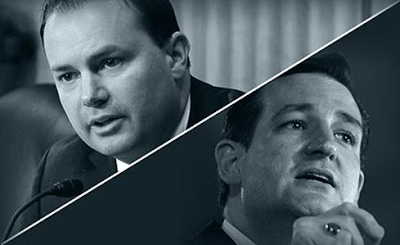Remember ‘the Nanny Party’ ?
Has anyone noticed that since the most recent Ebola outbreak began, we’ve been hearing less about Democrats as ‘the Nanny Party’?
Maybe paying attention to public health and public safety is starting to look good.
What with one thing and another, there has been less from the GOP, lately, about
- defunding the Centers for Disease Control and Prevention (CDC)
- slash-and-burn budget-cutting across the board in the U.S. government, including cuts to funding for the FAA and for U.S. airports where international passengers will be screened for Ebola, funding for the four specialized hospitals in the U.S. where Ebola patients are treated, and funding for vaccine research
- abolishing the Environmental Protection Agency (EPA)
- repealing the Affordable Care Act
There has been less blatant use even of the broad-brush “tax and spend” mantra, and when it is used, the slogan is a sign of a fading campaign.
Not that the bad days are gone forever.

Mike Lee, Ted Cruz
For one thing, whack jobs are still out there, running for office in 2014. Regardless of the outcome in the race for U.S. senator from Iowa in 2014, it will remain incredible that a candidate like GOPer Joni Ernst could run. For the record, Ernst is another candidate who has called for eliminating the EPA–along with the IRS (i.e. funding our government) and the Department of Education.

Joni Ernst claims
For another, the Republican Party generally tones down most of the most rapacious proposals right before an election. The (perennial) game plan is to sound halfway decent, for the few weeks leading up to elections, and then to implement the Let’s-bring-back-the-Great-Depression policies in office afterward.

More later
The fundamentals are always in place, beyond the silly ‘nanny’ ridicule, beyond the opposition to all public health programs, beyond even the attacks on federal agencies that many people have noticed.
Of our two major parties, by and large it is always the Republican Party that supports the three strategems most dangerous to public health and public safety, along with jobs:
1. Privatizing. See Rick Allen in Georgia (“no position”? on Social Security?). Rick Scott in Florida; also here. Dan Benishek in Michigan, also here. Rick Snyder in Michigan. Fred Upton in Michigan. Tom Cotton in Arkansas.
2. Outsourcing. See House Republicans (CISPA). Terri Lynn Land in Michigan. David Perdue in Georgia; also here. Rick Scott in Florida. Scott Brown in Massachusetts New Hampshire. Tim Walberg in Michigan.
3. Offshoring. See Senate Republicans. David Perdue in Georgia. Carlos Curbelo in Florida.
What privatizing, outsourcing, and off-shoring have in common–aside from damage to employment at a decent wage–is that they are all inherently potential security breaches.
Contracting out to private companies shifts you from cave canem to the dog that didn’t bark in the night. No more public watchdog means lower standards, less accountability to the public.
Outsourcing to a raft of ‘contractors’ leads to a raft of ‘subcontractors’, and each additional level of contracting is another pore (figuratively speaking) to breed suppurating pustules of incompetence, theft, and neglect.
Off-shoring is not only a way to undermine the U.S. middle class. Off-shoring jobs opens more doors to fraud; off-shoring assets enables tax evasion on wealth, including the wealth of multi-national corporations.
All of this is fairly clear. The national political press should report it more clearly.



